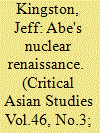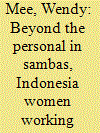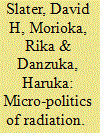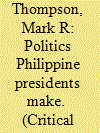|
|
|
Sort Order |
|
|
|
Items / Page
|
|
|
|
|
|
|
| Srl | Item |
| 1 |
ID:
132902


|
|
|
|
|
| Publication |
2014.
|
| Summary/Abstract |
Prime Minister Abe Shinz()'s nuclear renaissance involves downplaying risks, restarting reactors, building new ones, and exporting reactor technology and equipment. Polls in japan indicate that the public remains overwhelmingly op- posed to Abe's nuclear agenda, but in various national and local elections since late 2012 antinuclear candidates have not fared well. This article examines the disjunc-ture between public preferences and electoral outcomes and why is it likely that Japan will restart reactors despite widespread concerns about safety, the high costs of nuclear energy, and the lack of a site for permanent disposal of nuclear waste. The safety myth is being reealibrated, but the author argues that it remains based on rosy assumptions in a nation especially prone to massive seismic disasters. The reinstatement of nuclear energy in the 2014 national energy policy marks a victory for the nuclear village, a remarkable example of institutional resilience in the face of extremely adverse developments since the massive earthquake and tsunami of 1 1 March 2011 that precipitated three reactor meltdowns in Fukushima. Despite extensive revelations about shoddy safety practices in the nuclear industry and collusive relations between regulators and those they regulate, Abe has successfully promoted a nuclear revival that few would have thought possible before his election in 2012. Reactor restarts face a number of hurdles, but the pronuclear lobby now finds it has a policy opening. The summer of 2014 has been a nuclear-free one, but in all likelihood it will be Japan's last for decades to come.
|
|
|
|
|
|
|
|
|
|
|
|
|
|
|
|
| 2 |
ID:
132900


|
|
|
|
|
| Publication |
2014.
|
| Summary/Abstract |
Sambas, a regency in Indonesia's West Kalimantan Province, on the border with Sarawak (Malaysia), provides a distinctive borderlands perspective from which to evaluate the economic and social transformations that accompany Indonesian women's labor mobility. Drawing on village surveys and case studies about women's cross-border activities in Sambas, this article examines the complex inter- section between women's working lives and economic sectors, including those conventionally labeled formal, informal, subsistence, and capitalist. The increasing involvement of young Indonesian Malay women in labor migration has also fostered new marital and familial patterns, which may in turn generate further shifts within the organization of cross-border work and family in the future. These changes illuminate issues of agency and precedence that arise out of local economic histories and family patterns of labor and labor migration. This analysis of both continuities and transformations in women's cross-border labor leads us to attend to women's creative engagement with the opportunities and constraints they face in reaching their personal and economic aspirations. One opportunity, this study shows, was women's proximity to an international border. This location they turned into an economic asset, one that harnessed the productive power of the border.
|
|
|
|
|
|
|
|
|
|
|
|
|
|
|
|
| 3 |
ID:
132903


|
|
|
|
|
| Publication |
2014.
|
| Summary/Abstract |
The triple disasters of 1] March 2011 in northeastern japan have exacerbated existing vulnerabilities and created new ones all over the Tohoku region. In Fukushima, the fear of radiation has been compounded by the perception of the state's failure to provide timely and relevant information to local residents. This lack of information has particularly affected one of the most vulnerable segments of the population, young mothers with children, forcing many [0 make impossible choices between supporting the economic rebuilding of their communities and protecting their children from the threat of radiation. Based on detailed ethnography and interviews conducted from just weeks after the disaster, this article discusses the ongoing struggle of women to find a place of safety and a voice of protest in the face of local and national efforts to silence their fears.
|
|
|
|
|
|
|
|
|
|
|
|
|
|
|
|
| 4 |
ID:
132901


|
|
|
|
|
| Publication |
2014.
|
| Summary/Abstract |
In political systems with a powerful chief executive, such as in the Philippines, an essential element in the analysis of politics is a clear understanding of the impact of presidential politics. Two analytical theories have tried to understand this phenomenon: (1) a voluntarist, actor-centered, presidential-style approach, and (2') a structuralist, patronage-based approach. This article shows that neither approach provides a satisfactory account of the country's presidency. A more useful approach, the author argues, is the relational one (leveloped by US. political scientist Stephen Skowronek to analyze the presidency in the United States. Skowronek studies whether presidents attempt to govern in accordance with, or in opposition to, an existing presidential regime-a prevailing set of ideas, interests, and institutional arrangements. This approach allows for the assessment of the choices presidents make within structural constraints while differentiating the performance of presidents from their role as patron-in-chief. In order to apply this theory to the Philippine presidency however, it must be modi?ed to take into account campaign narratives, strategic groups, and institutional instability' Post- Marcos presidents, the author concludes, can best be evaluated based on how close their association was, or is, with the dominant reformist regime, which employs a narrative of good governance and democratization.
|
|
|
|
|
|
|
|
|
|
|
|
|
|
|
|
| 5 |
ID:
132904


|
|
|
|
|
| Publication |
2014.
|
| Summary/Abstract |
The trifecta of disasters in japan that unfolded on 1 1 March 201 1 strains credibility: a 9.0-level earthquake (the largest ever recorded in Japan), a thousand- year tsunami that devastated a 300-kilometer stretch of coastline in northeastern Japan, and three nuclear reactors in meltdown, exposing signi?cant portions of japan to potentially dangerous levels of radiation. In the aftermath of these unprecedented disasters, the meaning and signi?cance of this disaster have evolved. As Japanese government authorities and the general public alike have come to un(ierstand the nuclear disaster in more nuanced terms, retrospective evaluations now cast this crisis in its historical context and are coming to calibrate the level of significance in more consistent terms than was the case in the immediate aftermath of the disaster. This article analyzes how media and government authorities assessed the Liu Kushima nuclear disaster from its onset and considers how cultural frames of reference came into play, leading to selective perceptions about the nature of the accident and its presumed effects. The author discusses the nuclear disaster as a "moral panic," as the media constructed a narrative arch that ampli?ed perceptions of risk in often melodramatic terms, filtering information that shaped public perception and influenced the action of decision-making elites. In addition to discussing how the nuclear disaster affected Japanese domestic politics, the article addresses the impact of the nuclear disaster on international alliances and its implications for the nuclear industry.
|
|
|
|
|
|
|
|
|
|
|
|
|
|
|
|
| 6 |
ID:
132899


|
|
|
|
|
| Publication |
2014.
|
| Summary/Abstract |
China's "Olympic Year" (2007-2008) was a watershed moment for the country and its ruling Chinese Communist Party. In this article, the author draws on her ?eldwork experience one of the few foreigners living in rural Tibetan regions during the Tibetan unrest in spring 2008 to consider the implications of the Olympic year from the margins of the state. Taking inspiration from recent anthropological debates about the nature of humanitarianism and sovereignty in neo- liberal and post-socialist states, the author on siders the Tibetan unrest and the Sichuan earthquake that occurred just three weeks later on 12 May as particularly emblematic disastrous events linked by a new biopulitics of "charity" or "compassion" (Ch. atlxin) in the context of state-led disaster relief. To get at the contested nature of morality and sovereignty in practice, the author focuses on nationally televised post- quake death rituals in which statist abstract compassion for lost Chinese citizens confronted the universalized compassion of embattled Tibetan Buddhist monastic communities.
|
|
|
|
|
|
|
|
|
|
|
|
|
|
|
|
|
|
|
|
|